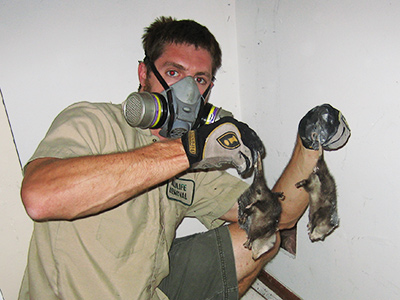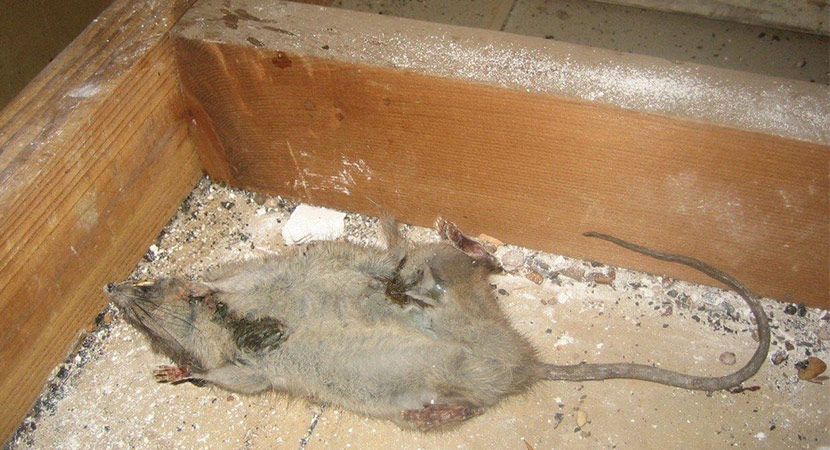Call me: 772-577-7008
Welcome to Port Saint Lucie Dead Animal Removal! Got a terrible smell in your house, or do you see a dead critter on your property? We are an animal control company specializing in the removal of dead animals from your home, attic, basement, walls, yard, or any part of your property. You clearly don't want a dead animal in your house. Carcasses attract flies and give off terrible smells, not to mention the potential diseases rotting flesh can cause. Whenever we remove dead animals, we use 100% safe methods and make sure to disinfect your home and get rid of all traces of odor. Click here for Free Roadkill Removal and click here for Dead Pet Body Removal. For deceased wild animals in your home or property, call us anytime at 772-577-7008 to schedule an appointment for today! We come out fast! Some of the services we offer include:
- Dead Animal Removal
- Foul Odor Diagnosis
- Full Property Inspections
- House Damage Repairs
- Dead Body Location Services
- Proper Carcass Disposal
- Cleanup & Decontamination Services
- Deodorization Services
CALL US ANYTIME AT 772-577-7008

No one wants to experience a day with a dead animal on their property. However, as wild animals become more accustomed to life in the urban jungle, this will likely happen to most of us. Dead animal removal can be a huge mess if it is not done by a professional. Moreover, it can encourage the spread of zoonotic diseases. In today's age, where most viruses are coming from wild animals, it pays to have the support of a company that you can trust. This is why we are here for you. With years of expertise, a complete set of equipment, and regular training, we will remove the carcass, sanitize your place, and disinfect it. We will also use products that can neutralize the odor. We only use safe treatments that will not expose the environment, materials, animals, and humans to further damages. We will make sure that you can carry on with your regular life, and we will not leave any mess behind. Once we have undertaken all the essential steps, we can also remediate any damages done by the dead animal. Rest assured that you will not find a single clue to your past problem once we are done with our service.
What Prices Do We Charge?
Learn about dead animal removal costs - each situation is different!
What if you found roadkill or a dead animal such as a deer in a public place, and you want the city or St Lucie County services to remove it for free? Click here for Free St Lucie County Dead Animal Removal services. What if a farm animal like a horse, or your beloved pet dog or pet cat has died and you need the body taken away? Click here for Dead Pet Body Removal.
We are experts in dead animal removal, and take our job seriously. When removing dead animals, we do a COMPLETE job — not only do we remove the dead animal from your home or yard, we also decontaminate the area, deodorize it, and dispose of the animal or cremate it. If you aren't sure whether the stench in your house is due to a rotting carcass or another reason, we can sniff it out with our noses from our years of experience. We remove dead raccoons, dead opossums, dead skunks, dead squirrels, dead birds, even dead dogs and cats. We frequently remove dead rodents from inside walls, because poison kills rats and mice, who die in your house. We completely solve your dead animal problem by taking these steps:
- Sniff out the dead animal if it is somewhere in your home
- When necessary, for example if the animal is in a wall or under your house, cut a hole to remove the animal
- Remove the dead animal, safely and completely (and seal the hole if needed)
- Finish the job by decontaminating and deodorizing your home
- Properly dispose of the dead animal through incineration or other means
- Prevent it from happening again by finding out how they got in your house
Dead animal carcass removal is specialty work. Sometimes the job is simple, such as a dead opossum in the yard, in which case we can simply wear our gloves and respirator mask, bag the carcass, and take it away for incineration. Sometimes this is more complex, such as when the dead animal is under a home crawlspace, under a porch or deck or shed. Or if the animal is larger, such as a dog or a deer. The most complex cases are dead animals inside the house. The animal may have died inside the attic, or down in the walls, or the duct work, or any other part of the architecture. You may have a bad smell in your home, and you're not even sure what's causing it. We've removed not just dead animals, but rotting food, bad mold, etc. We specialize in locating the source of the smell, and we very commonly cut a hole in the ceiling or wall to remove the animal. We remove every bit of the carcass, mop up the juices, vacuum the maggots, spray it and wipe it down with disinfectant, cleaner, and we repair the hole we cut. In some cases we use ozone machines to neutralize odor.
Port Saint Lucie Dead Animal Tip: Odor from Animal Feces in Attic

An attic infestation is a common problem many homeowners face. Wild animals like raccoons, rats, squirrels, and many others, actively seek out shelter in attics. They have learned that attics are warm and safe - the ideal place to raise their young ones. Moreover, living in attics keeps them in proximity to easy food from trash cans, bird feeders, gardens, and more. However, nuisance animals in the attic can wreak serious damage and even pose several health risks. One of the major concerns of wild animals in attics is their droppings. Wild animal feces stink! And aside from the terrible smell, it’s also a breeding ground for lots of diseases. If you find animal droppings in your attic, you can almost be certain you have a wildlife infestation problem. In this post, we examine some of the common animal feces, how they smell and look, as well as the health risks they pose.
Squirrels Droppings
As adept climbers, it’s not surprising that squirrels are one of the most common animals to take residence in the attic. Their cylindrical-shaped droppings are about 3/8 inches in length and 8 mm in diameter. It is usually round at the edges. The color of squirrel droppings ranges from red to brown due to their varied diet. Feces from squirrels have a strong odor mixed in urine, so their feces smell like ammonia.
Bat Droppings (Guano)
Bats droppings look like rice grains, but longer. When dried, their guano gets crushed into powder very easily. This makes it very easy for it to get airborne and spread harmful spores. Histoplasmosis is an infection caused by breathing in spores of a fungus often found in bat droppings. It can cause severe lung damage if left untreated. Bats usually leave waste in a single pile. So, over time, their droppings accumulate. Bat excrement produces a noisome odor as it decomposes in the attic. The pungent, musty, acrid odor can often be detected from outside a building containing a long-term or large colony.
Rat & Mouse Droppings
Rat and mouse droppings are familiar to most people. Mouse droppings look like round and tapered seeds that range between 1/8 and 1/4 inches in length. On the other hand, rat droppings are, on average, 3/4 inches long and 1/4 inches thick. But what’s more notable about their dropping is the sheer number. A single mouse can leave 50 to 70 pellets in a day. A quick way to tell if mice or rats are present is to check for scattered mouse droppings and an ammonia-like smell. The smell gets very strong in a confined space.
Raccoon Droppings
Although quite large creatures, raccoons are quite skilled at climbing and can easily reside in the attic. Raccoon feces are usually about two to three inches long, dark, and tubular. While their droppings look like that of dogs, what separates them is the presence of undigested food in raccoon droppings. Raccoons have very strong-smelling urine that can be detected from your living space, not to mention their feces, which is also very foul and repugnant.
Opossum Droppings
Opossum droppings look that that of raccoons, only that it has more curl. Moreover, possums’ dung is usually in a trail, while raccoon feces are usually in a single pile. Possums have multiple scent glands, including a red-brown gland near their bottoms in the pouch region. They mix the scent with urine or droppings to mark their territory.
Chipmunk Droppings
Chipmunk droppings look just like mouse droppings, only that they are about 1/4 inches longer. Moreover, chipmunk droppings are harder. However, it’s rarer to find chipmunk poop because they typically have designated underground burrows where they do their business.
Snake Droppings
Surprised? Like all animals, snakes also poop after a meal. Their feces can smell quite strong, especially when fresh. Their feces also promote bacteria buildup.
Wrap Up
All nuisance wildlife that resides in attics defecates from time to time. Their excrement can cause serious discomfort for homeowners, as well as spread diseases. The only way to control the problem is to deal with the infestation problem. Once the nuisance wildlife has been removed, you can then carry out a full attic cleanup and
We service nearby towns such as Port St. Lucie, Saint Lucie, Fort Pierce, Lakewood Park, White City, Indian River Estates, River Park, Fort Pierce North, Fort Pierce South,.